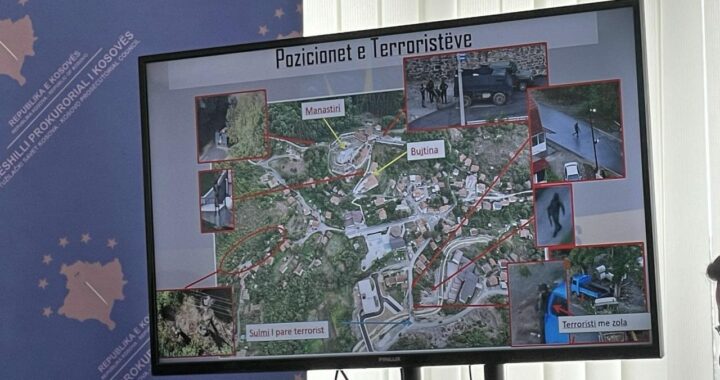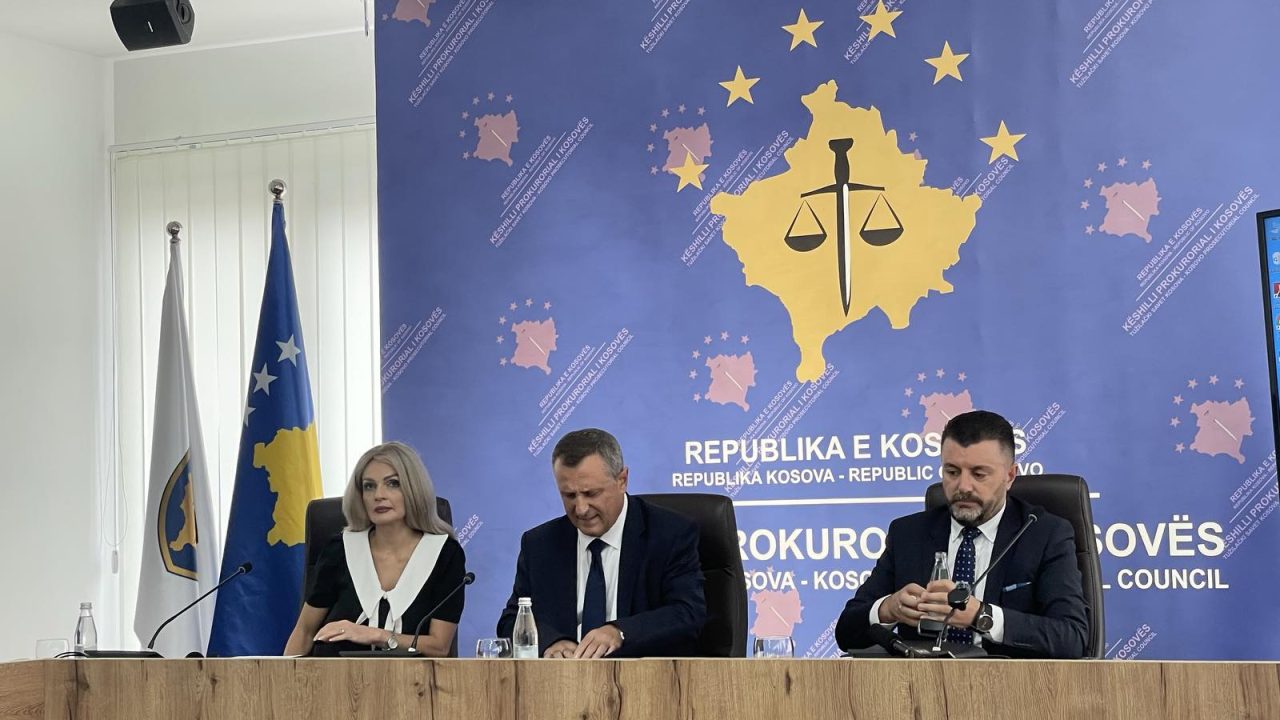

 The position of the Serbian gunmen during the Banjska attack, presented during the announcement of the indictment by the Kosovo Special Prosecution in Pristina on Wednesday. Photo: BIRN
The position of the Serbian gunmen during the Banjska attack, presented during the announcement of the indictment by the Kosovo Special Prosecution in Pristina on Wednesday. Photo: BIRN
Forty-five suspects, including powerful Kosovo Serb businessman Milan Radoicic, were charged by prosecutors in Prishtina over last September’s armed attack on Kosovo police officers in the northern village of Banjska.
Kosovo’s Special Prosecution announced on Wednesday that it has filed an indictment charging 45 over the attack in September 2023 by a Serb armed group in Banjska, near Zvecan, in which one Kosovo police sergeant was killed.
“We filed an indictment today against 45 suspects… There is a well-grounded suspicion that they have committed crimes related to terrorism, specifically crimes against Kosovo’s constitution order and security, financing of terrorism and money laundering,” Blerim Isufaj, head of the Special Prosecution, told ina press conference.
Naim Abazi, prosecutor of the case, called the armed gunmen a “well-structured group” and said that investigations in this case were “one of the most complex that prosecution has ever worked on”.
“Among the main suspects is the individual with the key position as group leader, Milan Radoicic, who has played an important role in coordinating criminal activity,” Abazi said, explaining that 120 electronic devices and hundreds of documents have been confiscated for the investigation.
During the attack, gunmen led by Radoicic killed Kosovo police officer Afrim Bunjaku and wounded two others in clashes near a Serbian Orthodox monastery in the municipality of Zvecan. Radoicic subsequently took full responsibility for the attack.
Commenting on the announcement of the indictments, Minister of Justice Albulena Haxhiu said the Kosovo government has also “demanded an international investigation into training bases [within Serbia]”.
“This attack was aimed at annexation of our territory,” Haxhiu said.
In October 2023, Radoicic was questioned by the Belgrade Higher Prosecutor’s Office on suspicion that, together with several unknown persons, he committed the criminal acts of association for the purpose of committing criminal acts, the unauthorised production, possession, carrying and trafficking of firearms and explosive substances, and aggravated crimes against general security.

Although he previously admitted leading the armed group in Banjska, he denied his guilt at the interrogation.
The Higher Court in Belgrade rejected a proposal for his detention based on the risk that he could abscond, but ordered him not to leave Serbia and confiscated his passport.
The Belgrade Higher Prosecutor’s Office told BIRN in August that it had asked the Kosovo authorities, via the EU rule-of-law mission EULEX, for “complete documentation regarding the critical event of September 24, 2023 in the town of Banjska”.
“To date, the documentation has not been submitted, nor has there been any response from EULEX,” the Higher Prosecutor’s Office said.
In August, Kosovo’s Ministry of Justice claimed that Serbia’s request for information about the attack in Banjska was invalid, as only the judicial bodies of Kosovo have jurisdiction over cases of crimes that have been committed within the country.
In April this year, the Kosovo authorities seized most of Radoicic’s property in the country.
Some aspects of the Banjska case remain murky. A BIRN investigation revealed that some of the weapons seized after the attack had passed through Serbian state hands over the previous five years. They included MRUD anti-personnel mines, 60mm M73 mortar rounds, M80 ‘Zolja’ anti-tank rocket launchers, and an M93 automatic grenade launcher, all of which were put on display by the Kosovo police.
The mortar rounds and anti-tank rocket launchers had passed through state maintenance centres in central Serbia in 2018 and 2021 respectively, BIRN can confirm.
The ammunition included assault rifle bullets that match those made in 2022 by the Belom factory, a Serbian state arms producer.
Kosovo has accused the Serbian authorities of being involved in the attack. The Serbian president and government have denied this. Prosecutors in Serbia claim the gunmen, three of whom were shot dead by police in the clash, obtained their substantial arsenal from Bosnia.
Bosnia denied this, but Kosovo nevertheless turned to Sarajevo for assistance, submitting a request for “mutual legal assistance” via the European Union office in Pristina.
Bosnia’s public prosecution confirmed receipt in December last year and said that it would investigate, without specifying whether any information it turns up would be sent to Kosovo.
Kosovo’s government has insisted that the involvement of Radoicic is a clear indicator of Serbian state support. Radoicic has dismissed the allegation.
11 September 2024 - 13:36

In Kosovo’s public discourse, early pregnancies are frequently portr...

A significant portion of the information consumed by the citizens of K...

Former intelligence agency chief Driton Gashi was sentenced to four ye...

Kosovo has emerged as a critical transit point along the Balkan route,...